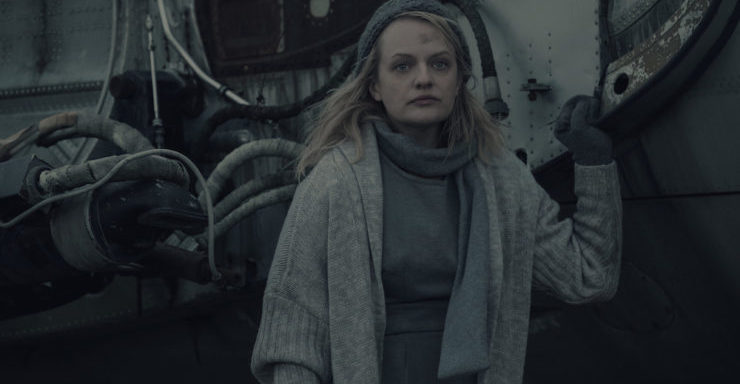Last week I came across an illuminating tweet: “The Handmaid’s Tale is really a white woman imagining herself on the Underground Railroad 😭” I admit that on my first and second reads of the book, I was too amused by Margaret Atwood’s wordplay, with Gilead’s Underground Femaleroad, to consider how Mayday smuggling (mostly white) Handmaids to freedom might appropriate the language of American slavery rather than put the dystopia in conversation with that era. Watching the latest episode of Hulu’s adaptation, I paid closer attention for signs that their take on the Underground Femaleroad might be more intersectional than the book. While it was still a white woman being led to freedom, the tracks on which the Femaleroad was laid operate on a fascinating gender divide: As June reflects, “Raise your daughter a feminist, she spends all her time waiting to be rescued by men.”
Spoilers for The Handmaid’s Tale 2×03 “Baggage”
Before any “choo-choo”s, metaphorical or otherwise, June is still holed up in the Boston Globe offices like Novalee Nation in Walmart—that is, getting her daily workouts up and down the flights of stairs, adding to the memorial she erected, and combing through back issues to start piecing together just how the Sons of Jacob created Gilead. (Very smart, in a world with very restricted Internet access!) Because she’s been here for two months, and has established just enough of a routine that when Nick says that Mayday will be putting her on the Underground Femaleroad—to get her north, just like she wanted eight weeks prior—she’s hesitant.
Two months ago, June wanted Nick, Hannah, and a car north to Canada. Now, the only thing he can offer her is the car—and not even that. Her path on the Underground Femaleroad begins with a kindly older man she knows only by his semi-regular deliveries, and he’s just one in a chain of men ferrying her to safety. Each link in the chain knows nothing beyond his particular orders, only that they are to help these women—which, I realized, is the ideal of male allyship without question or condition.
That said, asking a woman who has been reduced to an object by a cabal of men and raped by one in particular every month to trust a strange man is asking a lot. But would she be any more trusting of a female stranger? Aunts and Wives upheld the hierarchy just as much, if not more, when it came to psychological subjugation. White women, that is. The women of color are either Marthas or other Handmaids, and either unwilling or unable to provide much support.
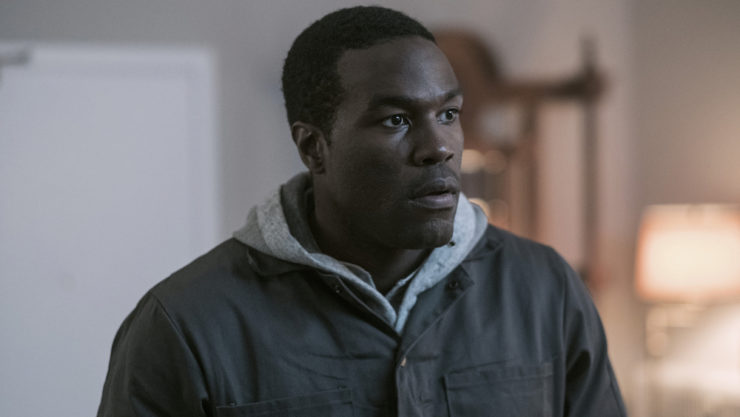
But it’s not just June sticking her neck out; each man must be either “brave, or stupid,” as the one unlucky enough to have his link break tells her. And the fact that this man is black, and has a family, complicates the matter of sympathizing with June when she forces him to take her with him even after the operation gets blown. She doesn’t know the latter, of course, nor that he is part of the Econopeople: the working class, not living in relative luxury like Commanders and Wives, who are just scraping by, the Econowives clearly fruitful but allowed to remain with their families so long as they don’t step out of line—because if they do, it’s the red dress and the wings for them.
This is our first real time spent with the Econopeople in the series: Instead of the book’s multicolored striped outfits (green/red/blue, to represent any/all of the roles they could take on), they wear dull gray that, weirdly enough, brings to mind the Abnegation faction from the Divergent series. They blend in with one another in a way that not even the Handmaids, in their eye-catching crimson, can; they keep their heads down but their ears perked, constantly spying on one another in their boarding houses.
While the Econowives in the book look down on Handmaids for “having it easy” as “sluts,” the clash between June and Heather is about children. The Econowife, whose young son Adam was presumably born pre-Gilead (he’s about Hannah’s age), declares that she could never imagine giving up her child to be raised by someone else: “I would rather die.” “Yeah,” June responds grimly, “I used to think that too.” Even if she doesn’t say so, Heather clearly believes that the Handmaids somehow welcome that sacrifice as a price for being venerated, or simply don’t care. She can’t see June as a mother, not even with her pregnancy (though it’s early enough that no one seems to clock it) nor when she plays trains with Adam.
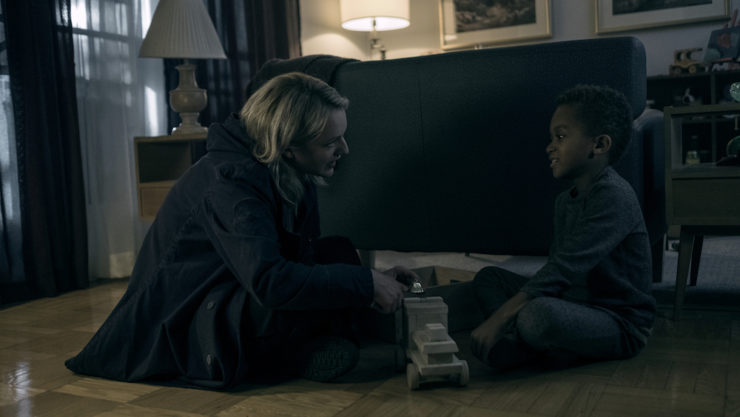
We don’t know why the family doesn’t return from their “public profession of faith” at the appointed time, prompting June to steal Heather’s clothes and flee, but it’s likely the Econowife doing whatever is necessary to protect her family. Earlier, when June asks the husband, the Mayday man, if he’s brave or stupid, he demurs that “I’m not brave… so.” While I would argue that self-deprecation, what he is is sympathetic, perhaps in a way that his wife cannot afford to be. And I don’t think that June necessarily blames her for it.
Motherhood is the baggage of the episode title, what June lugs with her from stop to stop on the Femaleroad and detours like this one, in which she plays Econowife heading to a job and then escaping into her woods. For the entire episode, she is haunted by flashbacks to her own troubled relationship with her mother: Holly Osborne née Maddox, a doctor at an abortion clinic and a protester who brought her young daughter along to rallies in which women would write the names of their rapists on pieces of paper and burn them. (“And I remember thinking, There were so many pieces of paper. So many—it was like snow.” Oh, my heart.)
As an adult, in the final years pre-Gilead, June clearly is not the “right” kind of modern woman her mother would want her to be: settling down with Luke, with a job as an Assistant Editor (in fancy duds) instead of leading activism or something else that doesn’t place her in a secondary role. Having waited until 37 to have June, though she was “very wanted” (and presumably there was a father in the picture at some point), Holly is disappointed:
“I sacrificed for you, and it pisses me off that you’re just settling.”
“Well, sorry. Guess I’m not your justification for existence.”
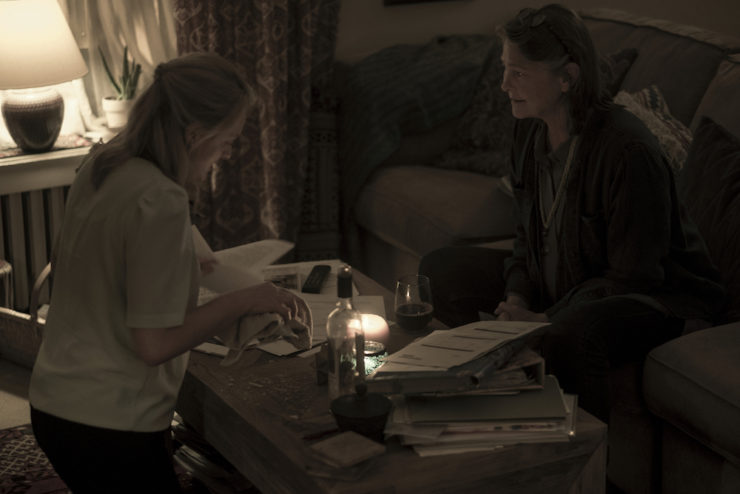
More than that, she warns her daughter that “this country is going down the fucking tubes.” (Listen, she is not wrong.) “It’s time to go out and fight, not just play house.” Of course, June brushes off her Cassandra-like intonations; and as we didn’t see Holly in season 1, it’s unclear if they were already estranged when Gilead began to take control, or if they lost one another in the chaos. A flashback to the Red Center reveals (as in the book) that June glimpses her mother in a photo from the Colonies: weathered, beaten but not yet beaten down. She has no idea if she lives or dies.
I’m hoping we get more of Holly this season—played by Cherry Jones, I have to imagine we do—because her depiction in this episode left me wanting. Pre-Gilead June clearly thinks that she’s the mother, and the willful, feminist woman who birthed her, who waves her arms out the window and sings “Hollaback Girl” while June is trying to drive, is the childish one. I’m not sure what the writers were trying to say with that, and how it frames Holly’s behavior, because she. was. right.
By the end of “Baggage,” Post-Handmaid June has somewhat made peace with this:
“No mother is ever completely a child’s idea of what a mother should be. And I suppose it works the other way as well. But, despite everything, we didn’t do badly by one another. We did as well as most. I wish my mother were here so I could tell her I finally know this. So I could tell her I forgive her. And then ask Hannah to forgive me.”
Because June has made it back onto the Underground Femaleroad, locating the pilot who’s supposed to bring her and a former driver over the border in the dead of night. And she’s accepted that the best thing she can do for Hannah is to go to Canada, try and find Luke or Moira, so that she can rescue her daughter with help. It was heartrending to watch her commit to that decision, as the plane starts to head down the runway—only for it to be shot down by those all-seeing Eyes, and for first the driver and then June to get dragged out into the dangerous light of Gilead. No more shadows.
So, where do we think June will go next? My bet is on the Colonies, since we had the foreshadowing of the Econowife saying that’s the punishment dangled for those who step out of line; and as far as the authorities know, June is just a fertile Econowife who tried to escape. And then she could maybe be reunited with her mother, if she’s still alive! Or is it back to the Red Center and into the arms of Aunt Lydia?
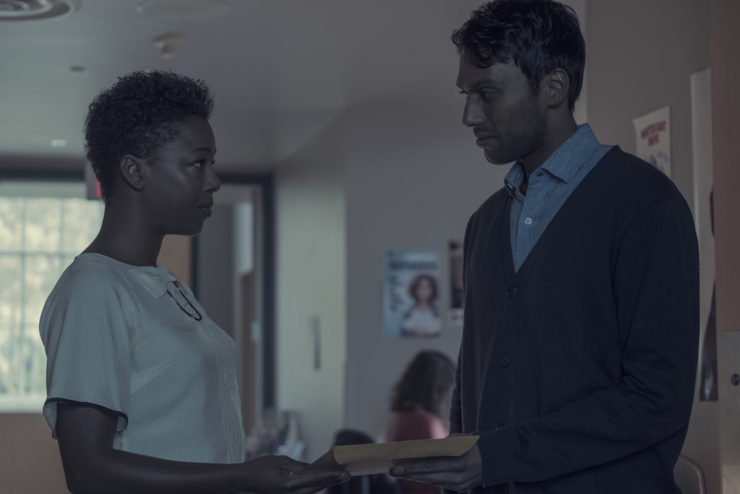
Scraps
- Despite spending a decent amount of the episode in Little America, I didn’t feel like we got very far in Moira or Luke’s stories. Hoping that future episodes tilt that balance a bit so not all of the stakes rest on June.
- Moira is clearly still processing her trauma, in the mirror-image of June stopping in front of her memorial every morning: She seems to avoid all mentions of Gilead, from running past the fence of missing or lost people without stopping to rebuffing Luke’s guesses about increased military activity on the border. Yet when she’s hooking up with a girl at the club, she uses her Jezebel’s name, Ruby. Her PTSD has her seeming to struggle with stitching together the “before” and “after” of her Handmaid life. I’m curious to see what will push her to do so—I’m betting it might involve rescuing June and/or Hannah.
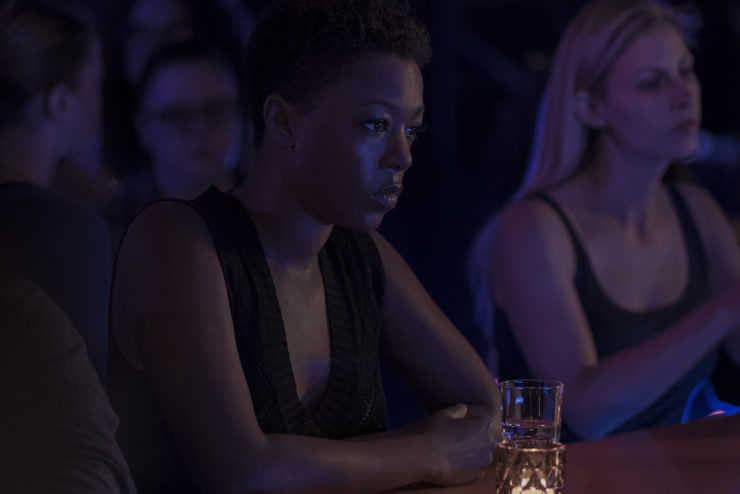
- Vox’s roundtable recap delves into June and Holly’s relationship with regards to their different forms of feminism better than I can, and points out how, by placing the 1985 novel in the 2010s, the timeline kinda collapses in on itself.
- Maybe June never changed her surname as a gesture to her mother?
- June’s donning of different hierarchical outfits—Handmaid, Jezebel, Econowife—reminds me of one of my favorite fantasy novels, The Glasswrights’ Apprentice, in which the protagonist must impersonate members in five different societal tiers by adding or subtracting syllables from her name. Would love to see June masquerading as a Wife, but that’s basically impossible since they’re so prominent and have entire families/households built around them; they’re the opposite of the anonymous Econowives.
- I wonder what that poor ex-driver did—“seduced” by a Handmaid? Gender traitor like the one Moira met?
- “You a good witch or a bad witch?” is a pretty great code for picking up a rogue Handmaid.
- The series has already been renewed for a third season. We’re still too early enough in season 2 to know where the story is going, but it’s already gotten pretty brutal. Would you want to watch a third season?
Natalie Zutter is glad her mom is visiting so she can give her a hug. Talk The Handmaid’s Tale season 2 and 3 predictions with her on Twitter!










